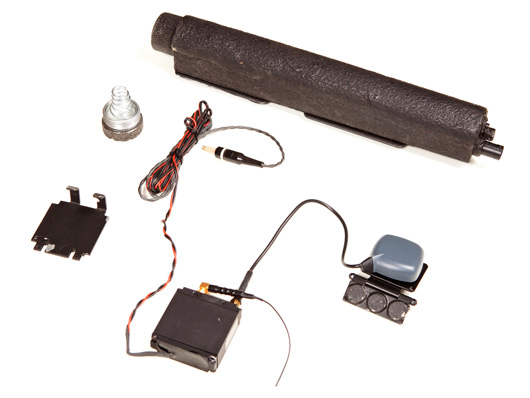GPS trackers have recognized the form of a search in the US

In our countries, this is not accepted, but in the United States, citizens periodically find tracking GPS devices installed by special services under the bottom of their cars. For example, Katia Thomas, an animal rights activist, found such a device in her car several years ago. She refused to return it to the owner (FBI), and instead gave the device to study , so now we know exactly how it works (at least, the model of previous years with lithium-thionyl chloride batteries for 10-20 years of service).
In addition, in many states, GPS bracelets are installed on individuals for whom you need to constantly monitor (for example, pedophiles, repeat offenders).
The police and intelligence services used GPS bugs quite widely to spy on suspicious individuals. It is known that in 2012, the FBI disconnected 3,000 such gadgets by decision of the Supreme Court, which declared unconstitutional the use of tracking GPS devices without a court order and decided to stop this practice.
')
Now the Supreme Court clarified its previous decision, extending it not only to cars, but also to individuals (which is quite logical). In the case of Torrey Dale Grady v. North Carolina , the Supreme Court judges expressed the unanimous opinion that installing a GPS tracker without the knowledge of the user violates the Fourth Amendment to the US Constitution.
The fourth amendment to the US Constitution reads :
“The people’s right to protect individuals, housing, papers and property from unreasonable searches and arrests should not be violated. No order shall be issued otherwise than if there is a sufficient basis, confirmed by an oath or a solemn declaration; while the order must contain a detailed description of the place to be searched, the persons or objects to be arrested. ”
Thus, GPS trackers are virtually equated to the form of “search and arrest”, from which citizens are protected by the US Constitution.
The decision of the Supreme Court is supported by lawyers of the Electronic Frontier Foundation (EFF): “It does not matter in what context, whether it is a car or a person. Installing a tracking device on a car or a person is a form of search, ”said Jennifer Lynch , a senior lawyer at EFF.
In the Torrey Dale Grady case, the state of North Carolina decided to put a GPS bracelet on a convict twice convicted of sex crimes in order to track his movements after another release from prison. He challenged the court’s decision, alleging a violation of his constitutional rights.
In Wisconsin and other states, some people convicted of sex crimes also have GPS bracelets hung for the rest of their lives . In general, electronic monitoring is used for GPS surveillance of "sex offenders" in 39 states (as of 2008). Now this practice will have to be reviewed. According to the logic of human rights defenders, the current system of punishments suggests that by the time of his release from prison a person has redeemed his guilt.
In addition to sexual connotations, it is also interesting how the Supreme Court will decide in the future with other devices that collect geolocation data about users.
Source: https://habr.com/ru/post/365331/
All Articles